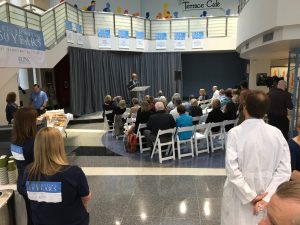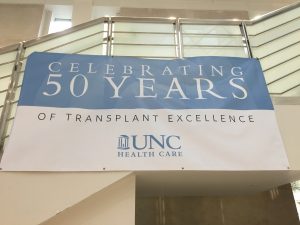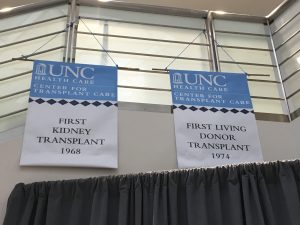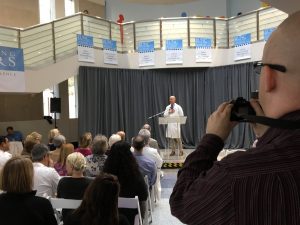The program’s major milestone was celebrated in the lobby of the UNC Children’s Hospital Monday morning with speeches from physicians that have made the program possible, along with a kidney transplant patient and his living donor.

The program’s major milestone was celebrated in the lobby of the UNC Children’s Hospital Monday morning with speeches from physicians that have made the program possible, along with a kidney transplant patient and his living donor.
Contact: Carleigh Gabryel, 919-864-0580, carleigh.gabryel@unchealth.unc.edu
November 8, 2018
CHAPEL HILL, NC – In 50 years the UNC Health Care Center for Transplant Care has provided more than 5,000 organ transplants, creating just as many incredible stories from the people that have been cared for. The program has not only grown to be a reliable standard of care for patients across the state of North Carolina, but is leading the way in the future of transplant procedures.
At the celebration event the Center for Transplant Care’s history was on display for visitors to see in the form of championship banners hanging throughout the hospital lobby, showcasing the program’s major achievements over the last five decades. Those successes were detailed by multiple speakers, including Lauren Kearns, MSN, RN-BC, Associate Vice President – operations for the UNC Medical Center, and Deborah Erickson, RD, PhD, Administrative Director of the Center for Transplant Care.
“UNC was one of the earliest transplant programs in the country, and following the success of the deceased donor kidney transplant program, built a comprehensive transplant center providing multi-organ transplantation for heart, lung, liver, pancreas and living donor kidney transplants,“ said Kearns.
“UNC is well known for many ‘first’ achievements, such as first laparoscopic donor nephrectomy, and innovative programs such as Autologous Islet Cell Transplantation, but is highly regarded for the compassionate care we provide our patients and families for life,” said Erickson.
Attendees also heard from Stanley Mandel, MD, who performed the first successful kidney transplant. He remarked on the evolution of the program that has grown from a handful of physicians setting out to provide what was then a seemingly daunting procedure, to the thriving center it has become.
David Gerber, MD, Medical Director of the Center for Transplant Care and Division Chief of Abdominal Transplant, thanked the staff and physicians that provide such a high level of care to patients.
“This is a team sport,” said Gerber. “It’s not about any one individual other than the patient. If you don’t have a great team like we have at UNC, it doesn’t work.”
Kevin Howell, a kidney transplant recipient, testified to the great care he received during a very frightening time in his life.
“I stand before you representing all the patients you actually helped along the way,” said Howell, N.C. State’s Vice Chancellor for External Affairs, Partnerships and Economic Development. “Thank you to all of you for giving me a second chance at life – and not only me, but also the thousands of other banner-worthy second chances.”
Howell’s kidney donor and colleague at N.C. State, Lindsay Recchie, also recounted her experience at UNC, thanking the staff and physicians that took care of Howell and herself along every step of the donation and transplant process.
 While there was much discussion of the transplant program’s past, there was also talk of the future. Chirag Desai, MD, founder and director of the Chronic Pancreatitis and Autologous Islet Cell Transplant Program, discussed the groundbreaking procedure he brought to the state of North Carolina. The procedure, which is only offered at around a dozen institutions across the country, starts with a total pancreatectomy. Insulin-producing cells from the pancreas are then harvested and reinfused into the liver where they can function. The goal of this procedure is to reduce pain, improve quality of life, and prevent severe diabetes. The program also lays the groundwork for cell transplant therapy for a variety of diseases in the future.
While there was much discussion of the transplant program’s past, there was also talk of the future. Chirag Desai, MD, founder and director of the Chronic Pancreatitis and Autologous Islet Cell Transplant Program, discussed the groundbreaking procedure he brought to the state of North Carolina. The procedure, which is only offered at around a dozen institutions across the country, starts with a total pancreatectomy. Insulin-producing cells from the pancreas are then harvested and reinfused into the liver where they can function. The goal of this procedure is to reduce pain, improve quality of life, and prevent severe diabetes. The program also lays the groundwork for cell transplant therapy for a variety of diseases in the future.
Dr. Gerber says every advancement made in transplant care at UNC comes back to the patient.
“Being able to see and hear all the patient stories helps us understand the impact we’ve had on their lives and on the lives of their family members,” Gerber said. “By giving someone a transplant, we reset their life timeline and allow them to live longer to see their kids and grandkids grow up.”
The 50th anniversary celebration event also included a display of the traveling exhibition, Art of the SCAR, and a Donor Quilt from Carolina Donor Services.

